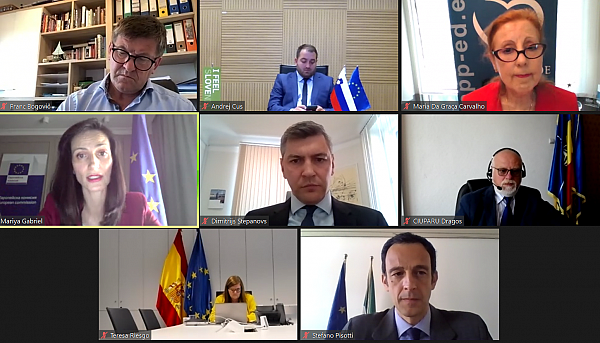Atividade Parlamentar Member States pledge to put innovation at the center of their national recovery plans, in high-level event hosted by MEP Maria da Graça Carvalho
Ministers, state secretaries and other high-level representatives of Portugal, Slovenia, Finland, Italy, Spain, Latvia, Romania, Belgium, Austria and France reaffirmed their commitment to make innovation a cornerstone of their national recovery plans, in a Knowledge for Innovation (K4I) Forum event hosted by its chair, Portuguese MEP Maria da Graça Carvalho.
The “Innovation at the Heart of Next Generation Europe” event was held this Monday and saw also the presence of European Commissioner for Innovation, Research, Culture, Education and Youth, Mariya Gabriel. In her keynote speech, Gabriel stressed the importance of receiving direct input from Member-States for policy development at the Commission, namely in regards to innovation and in specific to the establishment of a European Innovation Area.
In her opening statement, Carvalho started by emphasizing the “almost unique opportunity” that the EU and each individual Member State have of strengthening their innovation ecosystems, by taking advantage of the synergies established between different funds. “The national recovery and resilience plans can be used to complement national participations to the different Union programmes”, she remembered.
Furthermore, she explained how significant it is to adopt that approach, since “investing in research and innovation is a horizontal priority, key for our Green Deal, for any climate target, for our industrial resilience and the strategic autonomy of key value chains, but also for our health and our competitiveness in terms of emerging technologies”.
The event was part of a series devoted to the creation of a European Innovation Area (EIA), at the image of the existing European Education Area (EEA) and European Research Area (ERA), an idea defended in the EIA Manifesto, and da Graça Carvalho took the opportunity to call for this step forward. “It is a way to make sure we can all head towards the same goals and we all complement efforts and join forces”, she said.
Portuguese minister of Science, Research and Higher Education, Manuel Heitor pointed out several challenges that would benefit from a more coordinated approach, including the need to reinforce research careers, which he considered “a European Issue”, “the articulation between fundamental science and innovative breakthroughs” and “opening up data sources”.
Overall, even if there are still considerably different perspectives, the idea of a European innovation Area is gaining ground in the research and innovation community, making it more likely that it will one day become an official EU policy.


